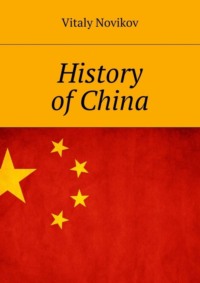Kitabı oku: «History of China»
© Vitaly Novikov, 2018
ISBN 978-5-4485-0331-3
Created with Ridero smart publishing system
Shang
People have inhabited the territory of modern China in the Stone Age. Archaeologists have found traces of their activity. The earliest finds date back to the third millennium BC. The ancient Chinese had a matriarchy, as the other ancient peoples. The kin was conducted by a father, but not a mother. Gradually the power passed into the tribes to men to the leaders. The leader of a tribe ruled together with the council of elders.
In the 18th century BC, the tribe Shang won Xia tribe. Shang created own state. Their political center was located in present-day Henan province. Shang is sometimes naming Yin. The social system of the Shang was the slave. In this state, the production of tools and weapons made of copper and bronze was established. Animal husbandry and agriculture were distributed. The millet was the most popular culture. At this time the moth has already bred for the production of silk. Mulberry trees were grown. In everyday life and for the war elephants were used, which brought the dependent tribes. A manufacture of various products has increased and therefore began to establish the exchange of goods. The measure of value was the cowrie shell, and when it did not have its analogues made of jade and other materials.
The Emperor ruled by King – Wang. Wang is about the governor. Hieroglyph Wang consists of two elements: a great and unique. Wang called the son of the sky, that is, his power in the ideological sense, had a divine origin. Wang was the nominal landlord of all the lands of the state, the high priest and the chief rolled into one. The slave-owning aristocracy was a step below in the hierarchy. These were the sons, relatives and subordinates of the king. Warlords called Hou. Bo literally means uncle. Bo used to be the rulers of areas. Zi also ruled areas. Zi is the king’s son. A broad layer of free people is represented mainly by farmers-commoners. These people are called Min – people or Xiaomin – small people. Slaves were the lower strata of society powerless they traded for things, sold, and sometimes sacrificed to the gods as well as livestock. The Shang had the army and prisons. The criminals were subjected to different executions: burning at the stake, hanging, quartering, beheading, burying alive in the earth. There were other punishments: cutting off the nose and ears, eye gouging, cutting off the hands and feet. Hieroglyphics suggest that people kept in the stocks, cells and pits – it was a species of a prison.
Shang kings subjugated neighboring tribes and their lands attached to their country. Other tribes became dependent from Shang kings. These tribes were paying tribute. The leaders of these tribes received various titles and honors from Shang kings. In this kind of dependence were tribes – Sian, Shoo, Chou. A lot of trouble brought Shang State nomadic tribes living in the north of its borders. Shang often fought with them. State Shang was destroyed Zhou tribe, when the leader of this tribe U Wang has defeated the army Shang ruled Shaw (Di) Xin in the Battle near Moe. A betrayal and a desertion to the enemy of the few Shang commanders contributed to the Zhou victory. The last ruler of the Shang Shou (Di) Xin rules from 1154 by 1122 BC (dates tentative, the exact dates are considered only from the 9th century BC).
Western Zhou
Western Zhou Civilization existed from the 12th to the 8th century BC. The center of this state was in what is now Shaanxi province. Western Zhou occupied a vast territory. It was divided into regions and principalities, the rulers of which must be during special ceremonies bring gifts to Wang. These ceremonies had a great importance. Abnormal behavior and non-compliance during this ceremony is considered an insult.
As in Shang, in the Western Zhou flourished slavery. Slaves had no rights and often die quickly. Needing in new slaves, Wang made military campaigns and made from prisoners of war the new slaves. Criminals have become slaves. Criminals also became slaves. The legislation had prohibited the use of wine and hunting, marriage between relatives. Everyone was obliged to respect their parents. Five types of penalties were introduced for the 3000 crimes. Mosin – ink stamp on the face for 1000 crimes, yixing – nose cutting for 1000 crimes, feysin – leg amputation for 500 crimes, goonshin – castration for men, for women turning into slaves-hermits for 300 crimes, dapisin – cutting off the head of 200 crimes.
Ancestor worship has continued to develop in religion. Ancestor worship has continued to develop in religion. Deaths representatives of the ruling dynasty worshiped first. The priests and diviners controlled religion. The victims were brought to the memory of the deceased Wangs. Human sacrifice was abolished, replaced by a straw man. Also pets used as victims in small quantities.
A son of the last Shang ruler U Geng has saved lives. U Geng can provisionally to rule in his country. Shang was divided into three parts. The ruler of Zhou sat in every part. U Geng rebelled against Zhou, but he was defeated. U Geng was killed. All Shang aristocracy was in captivity. Two towns built for them far from the Shang. They settled there, as ordinary people.
Ücretsiz ön izlemeyi tamamladınız.
